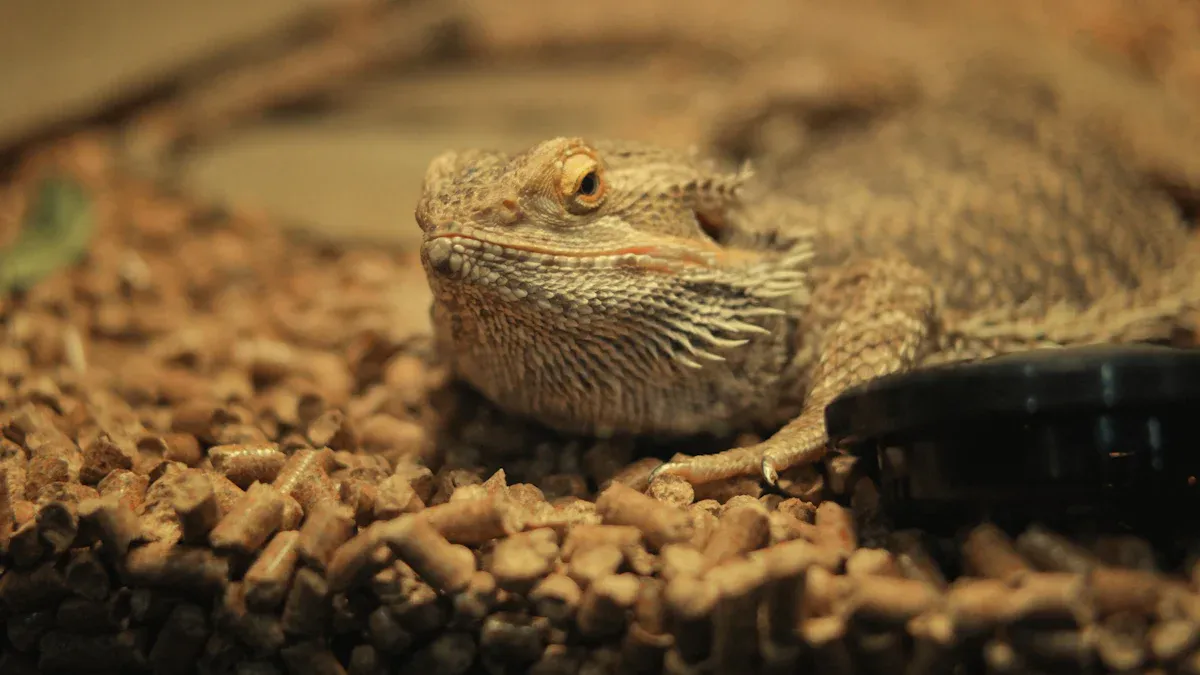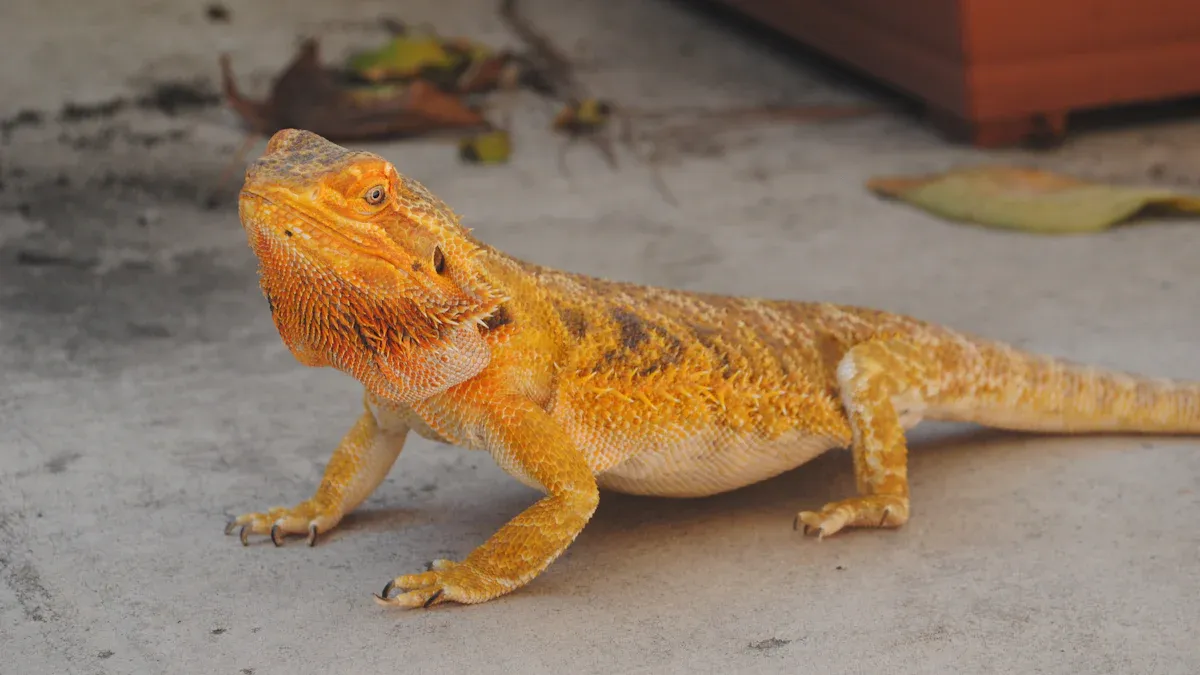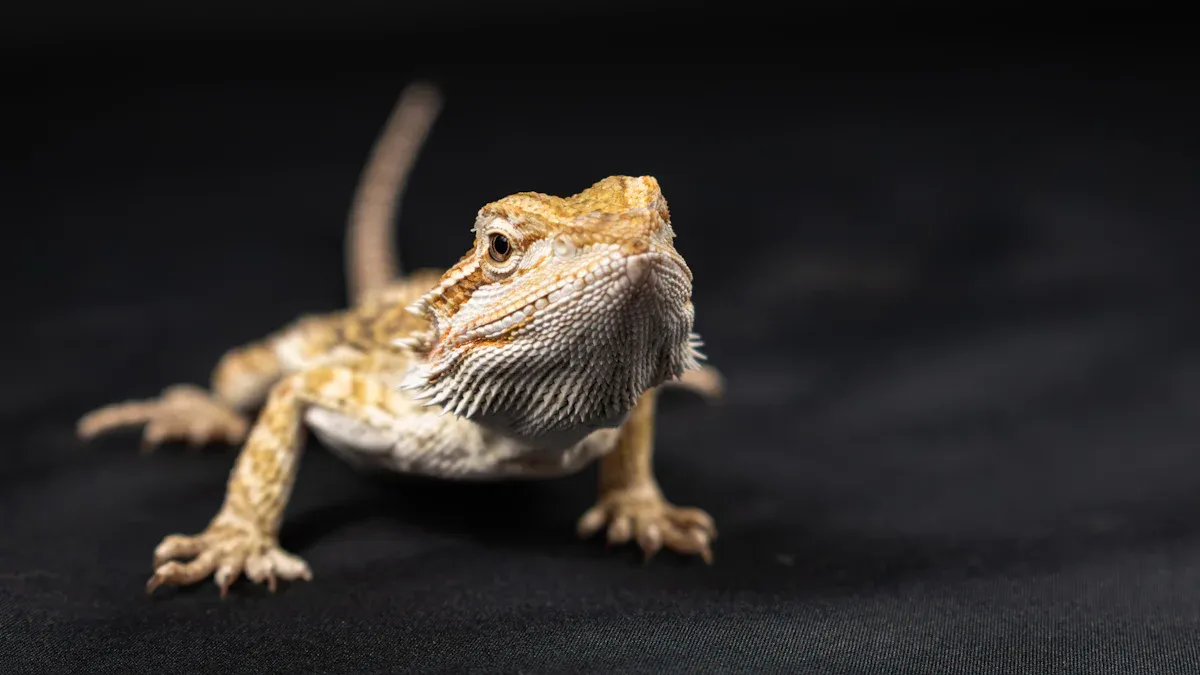
Are bearded dragon dried mealworms a good choice for your pet? Yes, but only in moderation. These treats can add variety to their diet, but feeding too many may cause problems. A balanced diet is key. Mixing bearded dragon dried mealworms with other foods ensures your pet stays happy and healthy.
Key Takeaways
- Give dried mealworms as a treat, not regular food. This avoids weight gain and stomach problems.
- Mix dried mealworms with greens and live bugs for balance. This makes sure your bearded dragon gets needed nutrients.
- Soak dried mealworms in water before feeding. This helps digestion and keeps your pet hydrated.
Are Dried Mealworms Safe for Bearded Dragons?
Safety considerations for dried mealworms
Dried mealworms can be a safe treat for bearded dragons when fed in moderation. However, there are a few things to keep in mind to ensure your pet stays healthy:
- Digestibility: Dried mealworms have a tough outer shell made of chitin, which can be harder for some bearded dragons to digest. Rehydrating them before feeding can help.
- Fat content: These mealworms contain moderate fat levels. Feeding too many can lead to obesity, especially in adult dragons.
- Calcium-to-phosphorus ratio: Dried mealworms have a higher phosphorus content compared to calcium. This imbalance can affect bone health if not supplemented with calcium-rich foods.
- Hydration: Since dried mealworms lack moisture, they can contribute to dehydration if not paired with water or other hydrating foods.
Some owners report that their bearded dragons thrive on diets that include mealworms. Others suggest combining them with live insects like crickets to maintain a balanced diet.
Tip: Always monitor your bearded dragon’s behavior and digestion after introducing new foods like dried mealworms. If you notice any issues, adjust their diet accordingly.
Comparing dried mealworms to live insects
When deciding between dried mealworms and live insects, it helps to compare their nutritional profiles. Here’s a quick breakdown:
| Nutrient | Mealworms (Dry) | Live Insects (Beetles) |
|---|---|---|
| Calcium | 0.12% | Low |
| Phosphorus | 0.83% – 1.42% | High |
| Fat | Moderate | Lower than larvae |
| Vitamin E | 30-32 IU/kg | Low |
| Vitamin A | 811-972 IU/kg | Varies |
| Protein | 51% (Beetles) | Higher in larvae |
| Chitin | 15% | Present |
Dried mealworms offer a concentrated source of protein and vitamins like A and E. However, live insects provide more hydration and are often easier to digest due to their softer exoskeletons. Both options can be part of a healthy diet, but variety is key.
Including bearded dragon dried mealworms as an occasional treat can add diversity to their meals. Pairing them with live insects ensures your pet gets the best of both worlds—nutrition and hydration.
Nutritional Value of Bearded Dragon Dried Mealworm

Nutrients found in dried mealworms
Dried mealworms pack a punch when it comes to nutrition. They are rich in protein, which helps support muscle growth and repair in bearded dragons. These mealworms also contain healthy fats, providing a good source of energy for active reptiles. Vitamins like A and E are present, contributing to better vision and a stronger immune system.
Minerals such as iron and potassium are also found in dried mealworms. Iron helps with oxygen transport in the blood, while potassium supports muscle function. Although these nutrients are beneficial, dried mealworms have a low calcium content. Calcium is essential for strong bones and preventing metabolic bone disease in bearded dragons.
Tip: Dust dried mealworms with a calcium supplement before feeding to boost their nutritional value.
Why dried mealworms are not a complete food source
While dried mealworms offer many nutrients, they are not a complete food source for bearded dragons. Their high phosphorus levels can interfere with calcium absorption, which may lead to health issues over time. Additionally, dried mealworms lack the moisture found in live insects, which can contribute to dehydration if not balanced with other hydrating foods.
Bearded dragons need a varied diet to thrive. Along with dried mealworms, they should eat leafy greens, vegetables, and live insects. This variety ensures they get all the vitamins, minerals, and hydration they need to stay healthy.
Including bearded dragon dried mealworm as part of a balanced diet can be a great way to add protein and flavor. However, it’s important to combine them with other foods to meet all nutritional needs.
Feeding Frequency for Bearded Dragon Dried Mealworm
How often to feed dried mealworms
Feeding dried mealworms to a bearded dragon requires careful planning. These treats should not replace their main diet but can be offered occasionally. For adult dragons, feeding dried mealworms once or twice a week works well. Juveniles, on the other hand, may benefit from slightly more frequent feedings due to their higher energy needs.
A good rule of thumb is to treat dried mealworms as a supplement rather than a staple. They can be given as a reward or to add variety to meals. Overfeeding dried mealworms can lead to health issues like obesity or digestive problems.
Tip: Keep track of how much your bearded dragon eats. This helps prevent overfeeding and ensures they get a balanced diet.
Adjusting feeding based on age and size
The age and size of a bearded dragon play a big role in determining how much and how often to feed dried mealworms. Younger dragons grow quickly and need more protein. Offering them dried mealworms 2-3 times a week, in small amounts, can support their growth.
Adult dragons, however, have slower metabolisms. They need fewer high-protein foods like dried mealworms. For them, once-a-week feedings are usually enough. Larger dragons may eat more in one sitting, but portion sizes should still be controlled.
Note: Always observe your dragon’s behavior and weight. Adjust the feeding schedule if they seem too thin or are gaining too much weight.
Including bearded dragon dried mealworm in their diet can be a great way to provide protein and variety. However, it’s important to tailor the feeding frequency to their specific needs.
Preparing Dried Mealworms for Bearded Dragons

Rehydrating dried mealworms for better digestion
Dried mealworms can be tough for some bearded dragons to digest because of their hard outer shell. Rehydrating them makes them softer and easier to chew. It also adds moisture, which helps prevent dehydration.
To rehydrate dried mealworms, soak them in warm water for about 10-15 minutes. This process softens the mealworms and makes them more appealing to your pet. After soaking, drain the excess water and pat them dry with a paper towel. Always serve them fresh and avoid leaving them out for too long, as they can spoil.
Tip: Use a shallow dish to soak the mealworms. This makes it easier to handle them and ensures they absorb water evenly.
Rehydrating dried mealworms is a simple step that can improve your bearded dragon’s digestion and overall health.
Combining dried mealworms with other foods
Bearded dragons thrive on a varied diet. Combining dried mealworms with other foods ensures they get a balanced mix of nutrients. Leafy greens like collard or mustard greens pair well with mealworms. Vegetables such as squash or bell peppers also make great additions.
To create a balanced meal, place a small portion of rehydrated mealworms alongside fresh greens and veggies. You can also dust the mealworms with a calcium supplement before serving. This boosts their nutritional value and supports bone health.
Note: Avoid mixing mealworms with sugary fruits too often. While fruits are fine as occasional treats, they shouldn’t make up a large part of your dragon’s diet.
Including bearded dragon dried mealworm in a mix of healthy foods keeps your pet happy and nourished. It also encourages them to eat a variety of textures and flavors.
Risks of Feeding Bearded Dragon Dried Mealworm
Digestive issues and prevention tips
Feeding dried mealworms to bearded dragons can sometimes lead to digestive problems. One common issue is impaction. This happens when food gets stuck in the digestive tract, making it hard for the dragon to pass waste. The tough chitin shell of dried mealworms can contribute to this problem, especially if the dragon doesn’t chew them properly. Baby and juvenile dragons are at a higher risk because their digestive systems are more delicate.
To prevent impaction, it’s important to feed dried mealworms in small amounts. Rehydrating them before serving also helps. Soaking the mealworms softens their shells, making them easier to digest. Providing plenty of fresh water and including fiber-rich foods like leafy greens in their diet can further support healthy digestion.
Tip: If your bearded dragon shows signs of impaction, such as a swollen belly or lack of appetite, consult a reptile vet immediately.
Avoiding overfeeding and ensuring dietary balance
Overfeeding dried mealworms can lead to obesity and nutritional imbalances. These mealworms are high in fat and phosphorus, which can cause health problems if consumed in excess. Adult dragons, in particular, don’t need as much protein or fat as younger ones.
To maintain balance, treat dried mealworms as an occasional snack rather than a main meal. Pair them with calcium-rich foods to offset their high phosphorus content. A varied diet that includes vegetables, greens, and live insects ensures your dragon gets all the nutrients they need.
Note: Keeping a feeding schedule and monitoring portion sizes can help prevent overfeeding and keep your dragon healthy.
Feeding dried mealworms to bearded dragons can be simple and rewarding when done right. Remember these key points:
- Offer dried mealworms as an occasional treat, not a staple.
- Combine them with greens, veggies, and live insects for a balanced diet.
- Rehydrate mealworms to improve digestion and hydration.
Tip: Monitor your dragon’s health and adjust their diet as needed.
Variety and moderation keep your pet happy and healthy. 🦎
Article author: Felix
FAQ
Can baby bearded dragons eat dried mealworms?
Yes, but only in small amounts. Baby dragons need more live insects for hydration and protein. Dried mealworms should be an occasional treat.
How do I store dried mealworms?
Keep them in a cool, dry place. Use an airtight container to maintain freshness and prevent moisture from spoiling the mealworms.
Should I dust dried mealworms with supplements?
Yes, dusting with calcium or multivitamin powder boosts their nutritional value. This helps balance the calcium-to-phosphorus ratio for better bone health.
Tip: Always check the expiration date on supplements to ensure effectiveness.

